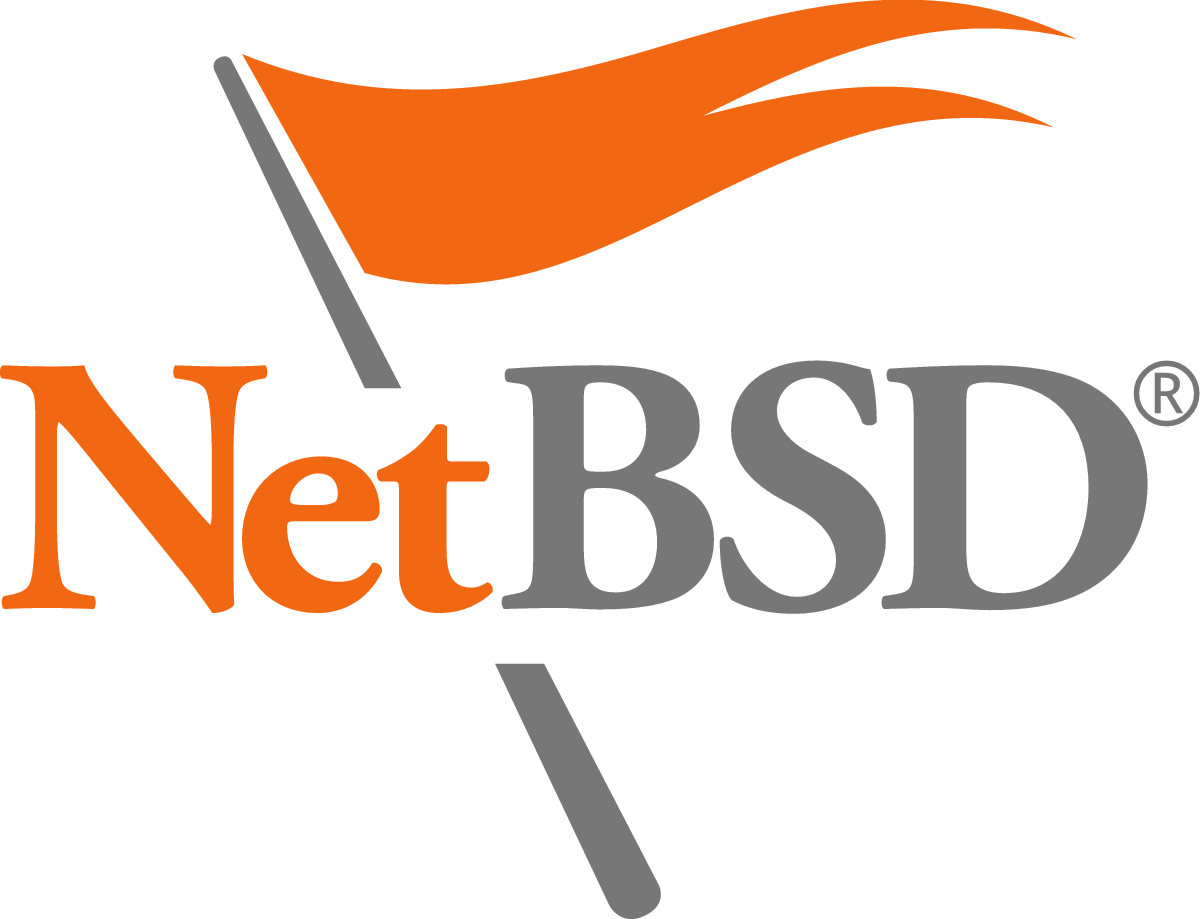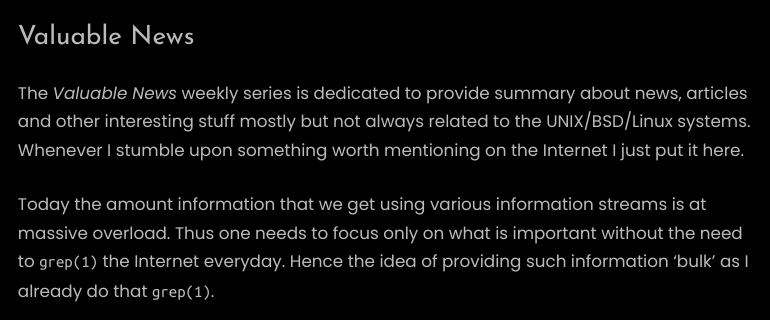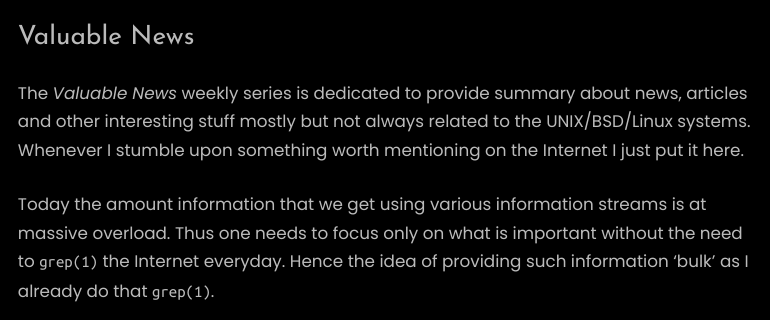Search results for tag #netbsd
 🔰 🇦🇺 boosted
🔰 🇦🇺 boostedBSDCan 2026 is now accepting submissions for the June 2026 conference, see https://www.bsdcan.org/2026/papers.html and links therein for instructions.
Submissions deadline is January 17, 2026, the conference runs tutorials June 17-18, talks June 19-20.
#bsdcan #conference #freebsd #netbsd #openbsd #bsd #development #networking #freesoftware #libresoftware
But VNC'ing into a small #NetBSD VM and launching X11 and Xeyes is really funny.
I missed Xeyes for some reason... 👀
Now, most of my installs are Debian, Linux Mint Debian Edition or Devuan.
I plan on doing more with NetBSD
Why and how we're migrating many of our servers from Linux to the BSDs
My BSDCan 2025 presentation, PeerTube and YouTube links:
PeerTube: https://tube.bsd.cafe/w/x4oPuHpCJK3qWFfdZtr7hd
YouTube: https://www.youtube.com/watch?v=UnVp25-6Qao
#RunBSD #FreeBSD #NetBSD #OpenBSD #BSDCan #ISolveProblems #Linux
 boosted
boosted🦾 6 BSDs Worth Trying Instead of Linux
https://www.howtogeek.com/bsds-worth-trying-instead-of-linux/
#BSD #FreeBSD #GhostBSD #MidnightBSD #NetBSD #OpenBSD #DragonFlyBSD #opensource #unix
The CfP for the BSD, illumos, OpenZFS, bhyve Devroom at FOSDEM 2026 is now available, you can start submitting your talk 🤩
https://people.freebsd.org/~rodrigo/fosdem26/
#Fosdem2026 #FreeBSD #OpenBSD #NetBSD #Illumos #ZFS #bhyve
boosts appreciated
 boosted
boostedAdvanced Programming in the Unix Environment
Did you know that #NetBSD comes with a number of historical Unix research papers and supplementary documentation? Here, we find papers by Marshall Kirk McKusick on the Fast File System, by Robert Morris and Ken Thompson on Password Security, a shell tutorial by Stephen R. Bourne, a guide to using vi(1) by Bill Joy, and the well known BSD IPC Tutorials! Take a tour through /usr/share/doc...
I dearly love #Slackware, don't get me wrong, but I have to say that, compared to #NetBSD it feels a bit on the heavier side, if you see what I mean...
Then again, I am doing a "slackpkg update" on a freshly installed VM, so there is that... 🤓

By the way, NetBSD is still looking for money to complete their 2025 fundraiser, so donate here: https://www.netbsd.org/donations/#how-to-donate
Latest 𝗩𝗮𝗹𝘂𝗮𝗯𝗹𝗲 𝗡𝗲𝘄𝘀 - 𝟮𝟬𝟮𝟱/𝟭𝟭/𝟬𝟯 (Valuable News - 2025/11/03) available.
https://vermaden.wordpress.com/2025/11/03/valuable-news-2025-11-03/
Past releases: https://vermaden.wordpress.com/news/
#verblog #vernews #news #bsd #freebsd #openbsd #netbsd #linux #unix #zfs #opnsense #ghostbsd #solaris #vermadenday
Latest 𝗩𝗮𝗹𝘂𝗮𝗯𝗹𝗲 𝗡𝗲𝘄𝘀 - 𝟮𝟬𝟮𝟱/𝟭𝟭/𝟬𝟯 (Valuable News - 2025/11/03) available.
https://vermaden.wordpress.com/2025/11/03/valuable-news-2025-11-03/
Past releases: https://vermaden.wordpress.com/news/
#verblog #vernews #news #bsd #freebsd #openbsd #netbsd #linux #unix #zfs #opnsense #ghostbsd #solaris #vermadenday
@tg9541 @stuartl
https://twitter.com/oshimyja
Uses touchscreen with #NetBSD https://www.netbsd.org/gallery/screenshots/oshimaya-drawing.jpg
But I guess if hardware is not supported it will be harder to get it working.
 boosted
boostedThanks to suggestions from @stuartl I learned a bit about *BSD and PC hardware by tracing my touchpad and keyboard problem in #NetBSD:
1. I found a forum thread about touchpad issues with a hint that #OpenBSD is known to have better touchpad support than NetBSD
2. the blog of Joshua Stein who works on notebook hardware compatibility in OpenBSD
To understand how hardware support works, the following is a great source!
I really wish it was easier to know how #NetBSD works on an OrangePi 5 (or 5+) or a BananaPi M7, or similar board I could get that has SATA or an M2 I could add a SATA riser to. 
 boosted
boostedI've finally given up on #NetBSD on the Odroid HC4 since, of course it doesn't run NetBSD. Instead, armbian linux just worked and has ZFS. That's disappointing, but not quite as disappointing as one of the two hard disks making a sad beeping noise instead of spinning up so the project still can't continue. 
A repurposed x86 laptop getting #NetBSD 11 beta via sysupgrade:
$ sysupgrade fetch
sysupgrade: I: Downloading https://nycdn.netbsd.org/pub/NetBSD-daily/netbsd-11/20251028150036Z/amd64/binary/sets/base.tar.xz into /var/cache/sysupgrade
@stefano #NetBSD is the best OS for the 1st Gen Pis!
It ran better than Alpine Linux in my Old Computer challenge:
https://kzimmermann.0x.no/articles/old_computer_challenge_2025.html
 boosted
boosted@stuartl I tried to watch Xorg.*.log with an ssh session.
What happens is interesting: for the 45s that it takes startx to do its thing all ssh console communication is blocked. When terminating X11 the console through ssh is unresponsive for a few seconds, too.
Needless to say that I didn't learn much more ;-)
Maybe I should try using a different machine to install #NetBSD on, and if only to learn what's normal and what's not.
Ce soir, on décide qui rentre et qui rentre pas sur le réseau ! #virtualisation avec #NetBSD et #NVMM, tout de suite sur https://twitch.tv/ahp_nils ! #sysadmin #devops #twitchfr #twitchstreamer #TwitchStreamers #BSD #qemu
 boosted
boostedWhen asking around what's a dependable OS for old hardware (e.g., my ASUS Eee PC 900A with a 32bit Atom N270) #NetBSD was recommended.
I'm now giving NetBSD 10.1 a try. The user experience is what people believe Linux is (which it is not): a complicated affair for tech-savvy people. Getting a GUI to work feels a bit like Linux in the late 1990s. Bummer that I forgot how to do that 😅
I could need some help: how can I use the built-in keyboard and touchpad of my laptop in X11? Anyone?
💰 NetBSD Foundation Appeals for $50K Donations Amid Funding Crisis
「 NetBSD faces a funding crisis in late 2025, with its foundation urging donations to reach a $50,000 goal after raising $10,738. The portable OS, powering servers and embedded devices since 1993, plans modernizations like Git migration. Community support is vital to sustain its evolution and cross-platform legacy 」
#netbsd #opensource #funding
https://www.webpronews.com/netbsd-foundation-appeals-for-50k-donations-amid-funding-crisis/
It's November... Can it start getting cool in the northern hemisphere yet? Here's to hoping. If it cools off enough, I may start up a second UltraSPARC machine.
pkgsrc-2025Q3
10.0: alpha 18044 (+974)
10.0: earmv4 12449 (+1906)
10.0: m68k 7461 (+197)
10.0: powerpc 17243 (+4044)
10.0: sparc64 14294 (+1235)
10.0: vax 6661 (stuck)
11.0: aarch64eb 22646 (+15; finished)
11.0: earmv4 1809 (+557)
11.0: m68k 2818 (+1421)
11.0: powerpc 1041 (stuck gem0)
11.0: riscv64 10731 (+4866)
11.0: sh3el 3348 (+2136)
11.0: vax 2867 (+1721)
oksh-7.8 is out! Sorry for the delay; was away at conferences.
https://github.com/ibara/oksh/releases/tag/oksh-7.8
#openbsd #netbsd #freebsd #dragonflybsd #bsd #linux #unix #solaris #illumos #macos #macosx #osx #aix #haiku #shell #ksh #oksh #sh #freesoftware #opensource #opensourcesoftware #oss
BSDCan 2026 is now accepting submissions for the June 2026 conference, see https://www.bsdcan.org/2026/papers.html and links therein for instructions.
Submissions deadline is January 17, 2026, the conference runs tutorials June 17-18, talks June 19-20.
#bsdcan #conference #freebsd #netbsd #openbsd #bsd #development #networking #freesoftware #libresoftware
🍎 Game Dev On IBook G4 With NetBSD / Hackaday
#netbsd #bsd #ibook64 #gamedev
https://hackaday.com/2025/07/23/game-dev-on-ibook-g4-with-netbsd/
♻️ Alex Haydock Saves a Nintendo Wii From the Scrapheap — and Turns It Into a NetBSD Web Server
「 Inside the compact housing was an IBM Broadway, a PowerPC G3-based processor running at 729MHz, plus 24MB of high-speed 1T static RAM (SRAM) and 64MB of GDDR4 memory for a total of 88MB 」
#netbsd #bsd #wii #retro
https://www.hackster.io/news/alex-haydock-saves-a-nintendo-wii-from-the-scrapheap-and-turns-it-into-a-netbsd-web-server-aebbf2c6492e
I'm running some tests on my old and trusted Raspberry Pi A+.
I've installed Raspbian - latest release, lite version. At the prompt, it's using 92 MB of RAM, mainly due to systemd and NetworkManager. As soon as you use it (even just for apt), it starts swapping and becomes almost unusable. It took 5 minutes just to install Python.
I tried NetBSD (on the same memory card): 35 MB of RAM used (including Postfix!) and it's totally usable.





![[?]](https://zia.io/media/c7d30b21a674a70256affdc92d62b3c664a56e41b422a6fa74796f9af4cc391c.png)